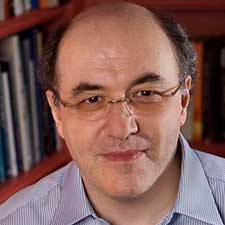1981 – MacArthur Award, California Institute of Technology
Books
Books Written by Stephen Wolfram
- Mathematica Books (1988-2003)
- A New Kind of Science (2002)
- Cellular Automata and Complexity:
- Collected Papers (1994)
- SMP Handbook (1981)
Books Edited by Stephen Wolfram
- Theory and Applications of Cellular Automata (1986)
- Cellular Automata: Proceedings of an Interdisciplinary Workshop (1984)
Articles and Papers
1975
- Hadronic Electrons?
1976
- Neutral Weak Interactions and Particle Decays
1977
- Lepton Energy Spectra in e+ e- Annihilation and Other Processes
- The Decoupling of Axial Mesons from Currents
1978
- Transverse-Momentum and Angular Distributions of Hadroproduced Muon Pairs
- Quantum-chromodynamic Estimates for Heavy-particle Production
- Positivity Constraints on Quark and Gluon Distributions in QCD
- The Effective Coupling in QCD
- Observables for the Analysis of Event Shapes in e+ e- Annihilation and Other Processes
1979
- Abundances of New Stable Particles Produced in the Early Universe
- Heavy-particle Production by Cosmic Rays
- Electromagnetic Radiative Corrections to Deep-inelastic Neutrino Interactions
- Event Shapes in e+ e- Annihilation
- Tests for Planar Events in e+ e- Annihilation
- Weak Effects in Sigma-zero Decay
- Bounds on Particle Masses in the Weinberg-Salam Model
1980
- Event Shapes in Deep Inelastic Lepton-Hadron Scattering
- The Development of Baryon Asymmetry in the Early Universe
- A Model for Parton Showers in QCD
- Spontaneous Symmetry Breaking and the Expansion Rate of the Early Universe
- Baryon Number Generation in the Early Universe
- Two- and Three-point Energy Correlations in Hadronic e+e- Annihilation
- Parton and Hadron Production in e+e- Annihilation
1981
- Weak Decays
- Cosmological Constraints on Heavy Weakly Interacting Fermions
- Cosmological Baryon-Number Generation in Grand Unified Models
- SMP: A Symbolic Manipulation Program
1982
- QCD Expectations for High-Energy Hadronic Collisions
- Calculation of Cosmological Baryon Asymmetry in Grand Unified Gauge Models
- Cellular Automata as Simple Self-Organizing Systems
1983
- Properties of the Vacuum. 1. Mechanical and Thermodynamic
- Properties of the Vacuum. 2. Electrodynamic
- A QCD Model for e+ e- Annihilation
- Statistical Mechanics of Cellular Automata
- Cellular Automata
- Cosmology with Very Large Gauge Models
1984
- Geometry of Binomial Coefficients
- Algebraic Properties of Cellular Automata
- Universality and Complexity in Cellular Automata
- Computation Theory of Cellular Automata
- Cellular Automata as Models of Complexity
- Computer Software in Science and Mathematics
- Computing: A New Tool for Fundamental Physics
- Preface to Cellular Automata
- Complex Systems Theory
1985
- Symbolic Mathematical Computation
- Twenty Problems in the Theory of Cellular Automata
- Two-Dimensional Cellular Automata
- Undecidability and Intractability in Theoretical Physics
- Cryptography with Cellular Automata
- Origins of Randomness in Physical Systems
- Thermodynamics and Hydrodynamics with Cellular Automata
1986
- Analytical and Empirical Mathematics with Computers
- Random Sequence Generation by Cellular Automata
- Approaches to Complexity Engineering
- Cellular Automaton Fluids 1: Basic Theory
- Minimal Cellular Automaton Approximations to Continuum Systems
- Tables of Cellular Automaton Properties
1988
- Cellular Automaton Supercomputing
- Mathematics by Computer
- Academic Computing in the Year 2000
- Tablet: Personal Computer in the Year 2000
1990
- Who Uses Mathematica ?
1992
- Some Elements of Mathematica Design





